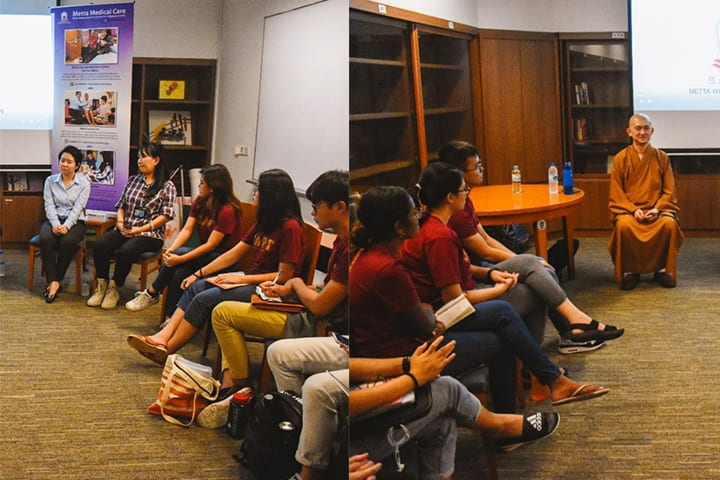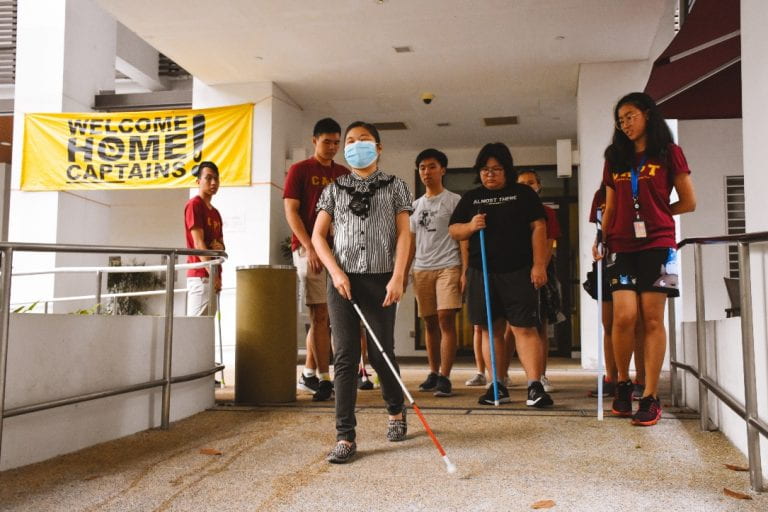Lavanya BALACHANDRAN and Sue CHANG-KOH
College of Alice & Peter Tan (CAPT)
Lavanya and Sue share their experiences of organising CAPT’s annual Community Engagement Festival (CE Fest) during 2020’s pandemic-informed context, particularly how they found alternative ways of making student learning through the College’s informal curriculum viable during this period of uncertainty and flux.

At the College of Alice & Peter Tan (CAPT), Community Engagement (CE) constitutes an integral part of the informal undergraduate curriculum. Perusing a rigorous learning outcomes framework1, CAPT annually runs more than 40 CE events with over 45 external community partners that include non-governmental organisations (NGOs) and schools. The annual Community Engagement Festival (CE Fest) is one such faculty-supervised student-led event, where CAPT students go on various trails to engage diverse communities in Singapore. The meticulous planning that goes into running the one-and-a-half day CE Fest includes a pre-engagement activity for each trail, facilitated by student leaders or community partners, wherein student participants are introduced to the particular community they have selected to engage with in the days leading up to the event. Back in December 2019, CE Fest 2020 was not planned any differently.
The pandemic’s rapid escalation in early 2020 and nationwide safe-distancing measures that were constantly changing alongside guidelines stipulated by the University and community partners meant that we, as faculty-in-charge and the student committee, had to outpace these shifting goalposts to hedge the risk of calling off the event altogether. This was not simply to avoid disappointing participants and student leaders who had expended hours of event preparation; it was also to find alternative ways to make the informal curriculum’s learning viable within the extreme uncertainty that marked this pandemic season.
Devising innovative and fail-safe Plan B options necessitated more time and effort to facilitate communication among the various stakeholders, encompassing faculty, the student organising committee, and the community partners while sourcing for other partners as backup in case of withdrawals. Eventually, the event ran on 20 March 2020 (prior to implementation of the nationwide circuit-breaker) with over 200 participants, including student leaders and facilitators. Six of the 10 trails were implemented as originally planned with safe distancing (Figure 1), while the rest were reconfigured versions held within the College (Figure 2).

(Image courtesy of CE Fest 2020 Organising Committee)

This experience revealed important lessons about peer learning and leadership. The ‘Differently Abled’ trail, which saw the engaged organisation withdrawing from the event due to the pandemic, paved the way for participants to learn from peers with disabilities who stepped up to become ‘partners’, or what Chesler et al. (2006) call “border-crossers” (Figure 3). The trail activities included role-playing and simulating the experiences of persons with disabilities. Drawing on peers to lead the trail provided a collaborative learning space for engagement and transformation (Chesler et al, 2006), evident in the high ratings given by participants for this trail in a post-event survey.

(Image courtesy of CE Fest 2020 Organising Committee)
On the flipside, recruiting student facilitators to assist the programmes team in running the trail towards the later stage of event planning ran the risk of creating a disjuncture between the initially proposed programme and its final execution. For another reconfigured trail, the partner organisation that withdrew face-to-face participation provided pre-recorded videos that student facilitators were expected to run the trail with. The facilitators’ limited knowledge of and exposure to that community’s specific issues and challenges became evident during the course of the trail and diminished participants’ learning experience for that particular trail.
The experience of running CE Fest 2020 in these unprecedented times has informed us in particular of two good practices that can help develop the scope of peer leadership:

As evidenced in the literature, the ‘Differently Abled’ trail illustrates that carefully curated peer engagement across diverse backgrounds, particularly between those in dominant and minority positions can challenge stereotypes and facilitate deeper introspection by pushing student leaders and participants beyond their comfort zone (Chesler et al., 2006). With appropriate skills training, peer facilitation empowers student leaders and increases the potential for change among participants during service-learning activities (Weisz & Black, 2010).

The impact of such skills training—encompassing proposal writing, budgeting and planning—from an operational standpoint however, hinges on when student leaders, particularly trail facilitators, are recruited. Early training of facilitators not only ensures better alignment of facilitator tasks with the proposed trail plan, it also ensures implemented trails have a better chance of successfully achieving the informal curriculum’s learning outcomes.
The lessons we learnt have contributed important insights for CAPT’s educators and administrators who collaborate with students and community partners to create positive service-learning experiences amidst unprecedented circumstances. As we guide the next cohort of student leaders for CE Fest 2021, we remain mindful that meeting educational goals in the informal curriculum goes beyond merely setting effective learning objectives. Rather, it requires adaptability and a concurrent reflection of processes while organising and managing community engagement activities.
 |
Lavanya BALACHANDRAN is a Lecturer at the College of Alice & Peter Tan. A sociologist by training, Lavanya’s interests in education include community engagement and the informal curriculum in institutes of higher learning, reflexive learning and inequity in education. Lavanya can be reached at lavanyab@nus.edu.sg |
 |
Sue CHANG-KOH is a Senior Lecturer at the College of Alice & Peter Tan, where she is also the Director of Community Engagement. She is a strong supporter of field trips, learning outside the classroom, and enjoys engaging with students, community partners and institutions. She is keen to foster a community that learns, engages, and has a lasting impact on its members. Sue can be reached at rc3scsf@nus.edu.sg |
Endnote
- The four intended learning outcomes (ILOs) of CAPT’s informal curriculum are (a) building awareness about different communities including the marginalised, (b) developing empathy, (c) reaching a deeper understanding of the strengths and (d) challenges of communities and acquiring skills to contribute effectively towards active citizenship.
References
Chesler, M. A., Ford, K. A., Galura, J. A., & Charbeneau, J. M. (2006). Peer facilitators as border crossers in community service learning. Teaching sociology, 34(4), 341-356. https://doi.org/10.1177/0092055X0603400402
Weisz, A. N. & Black, B. M. (2010). Peer education and leadership in dating violence prevention: Strengths and challenges. Journal of Aggression, Maltreatment & Trauma, 19(6), 641-660. https://doi.org/10.1080/10926771.2010.502089

